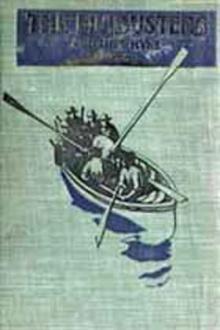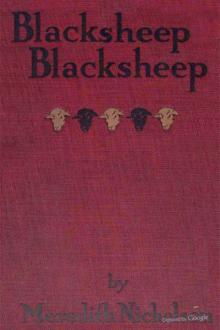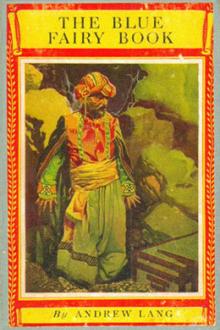The Filibusters, Charles John Cutcliffe Hyne [best book clubs .TXT] 📗

- Author: Charles John Cutcliffe Hyne
- Performer: -
Book online «The Filibusters, Charles John Cutcliffe Hyne [best book clubs .TXT] 📗». Author Charles John Cutcliffe Hyne
Nobody raised an objecting voice. Indeed, if facial expression meant anything, every man present was cruelly pleased with the sentence, and those who were sound enough to do so set about collecting wood and getting the ropes rove over the bough with all the good-will in the world.
Personally I must confess then to a feeling of freezing terror. It seemed that nothing but a miracle could prevent my getting my exit from this life by the most abominable of tortures, and miracles were not in the habit of coming in my way. My faith, how I did envy Carew then as being dead already, or, at any rate, senseless. I hadn’t a bit of hope that the earless man or any of his friends would go back on their decision. They were brigands pure and simple, had lived in touch with brigandage all their lives, and had probably seen this same punishment of roasting to death inflicted before. It was nothing new in Sacaronduca, and there is no crueller devil-inman’s-image than a brigand of Sacaronduca.
YOU who read this memoir will probably have learned of these preparations of the brigands for our discomfort with something of a shudder; we two who watched them with such supreme personal interest felt our veins full of icicles. I say we two, for as it turned out afterwards Carew was in full possession of his senses, and was only simulating unconsciousness for any advantage which might accrue therefrom.
The blow from the pistol butt had certainly stunned him for the moment, but the shower of kicks seemed, curiously enough, to revivify him; and he was stoic enough not to express his pain. Indeed, as he said afterwards, the fellows were all shod with the sandal of the country, and if you keep your body limp these cannot deal out any vast hurt. It was a mortification to him when they lashed his wrists and heels, even as they had lashed mine, so as to make sure that he should not inconveniently come to life again; but he had the wit to make no further resistance, knowing full well that he could not escape just then, and hoping as usual all things from the future. It was one of the mottos of Sir William Carew’s adventurous life never to believe he was going to die, however black the momentary outlook might be; and by this means he had more than once escaped being killed when a less hopeful man would have thrown up the sponge.
And as it turned out, in this particular instance a respite came. The thudding of a horse made itself heard as it galloped down the forest road, and our captors picked up their arms and slipped into cover. For the moment we two intended victims were left, with our heels made fast to the hauling ropes, and the pyre already ” in situ” under the tree. Half a minute could see us hove up with our heels towards the branch of the magnolia, and our faces beginning to purple and blister over the bright crackling flames; and as any other fate, however dreadful it might be, was preferable to this horror, I can tell you we waited the oncoming of that horseman with a very paroxysm of anxiety. Would he come to interfere? Would he pass by on the other side, judiciously non-interferent? Or would he halt awhile and idly overlook the spectacle? In my horrid suspense, one or other of the last two alternatives seemed a certainty. I had been long enough in Sacaronduca to understand the ways of a native. It was considered all through the country vastly impolite to interfere with another gentleman’s vengeance. And what chance could make this newcomer one who in any way would be interested in our welfare?
The horseman drew near with intolerable slowness. He even slackened his animal’s gait to a walk. He did worse; though it seemed a blasphemy to do such a thing, he started to hum a melody. And then just out of sight of us he halted to roll a cigarette. So still was everything, so feverishly quickened were my senses, that I could even hear the crinkling of the paper as it crisped between his ringers. But the tree stems of the dense undergrowth still hid him from view, and my eyes glancing upwards caught sight of a loathsome turkey buzzard gallinaso, as they call it in Sacaronduca slowly circling down from the sky in anticipation of a meal.
The omen of the bird sent a fresh chill through me. I had been long enough in the country to have imbibed the local belief that the gallinaso is a fowl of the devil, and that it never comes down from its sentry-go above without an absolute certainty that meat will be spread for it.
My ears caught the faint splutter of a sulphur match as the unseen man, with exasperating slowness and deliberation, lighted his cigarette, and then came a cheerful ” arree,” and the renewed thudding of horse-hoofs upon the soft turf-covered road. A moment later he came into sight, saw us two on the ground, with the hauling ropes over the magnolia branch, the pile of faggots, and the four dead men lying under the shadow of the bushes beyond; and he pulled up his horse and gave a queer surprised lift to his eyebrows.
His headgear was an ancient beaver shovelhat; his outer dress a rusty cassock; and beneath it showed a well-darned stocking and the heel of a sturdy shoe projecting out of a box stirrup. He had a fine seat on his horse, but his looks as well as his garb quite put him down as the ecclesiastic.
Presently the brigands began to come one by one out of the cover, and he gave each one a sharp separate look, and a nod of dry recognition.
“Ah,” he said at last, ” and is Manuel knocked over? I do not see Manuel here on his legs, and he doesn’t appear to be lying on the ground yonder.”
“He was here a minute ago,” said someone. “He is close at hand if your Excellency wishes.”
The earless man, with an embarrassed snarl, meant I suppose to be an easy laugh, swung into sight from behind the trunk of the white flowered magnolia. ” Eh, Father Jupe,” said he, ” is this you?”
“I feel sure of it myself,” said the priest.
“We did not expect you, Father.”
“I can imagine it,” said the priest with increasing dryness. ” So you have been dabbling in politics again, eh, Manuel?”
“You know I was always for Maxillo, Father.”
“Pardon,” said the priest, ” I had forgot. I thought you were always for el presidente Don Manuel. But then these trifles do slip out of the memory. And your visitors here, you were merely trying to give them a little scare, I suppose.”
“Merely that,” said the earless man.
My spirits rose. The priest had evidently authority. Here indeed was a rescuer come to us as by a miracle. But the next few sentences damped my spirits again pretty effectually.
“Ah,” said the priest, ” from the trouble and preparations you seem to have gone through, / feared that perhaps you were going to waste them. You see, Manuel, I have known your angry passions run away with your, shall we say, sense of economy before, and as these two Englishmen appear to have made a pretty useful fight of it, I was afraid in a moment of indignation you were going to offer them up to the manes of your departed fellow-thieves.”
“Father Jupe,” said the earless man with a sudden bristle of anger, ” you go too far. We are patriots.”
“Patriots with appetites, shall we say, my dear Manuel? Your commissariat is so perpetually breaking down that you are compelled by the barest instincts of self-preservation to forage. Must I congratulate you over your last coup? Judging from the way these gentlemen have defended themselves they must have had well-lined pockets?”
The earless man with a little tornado of disgust described the loot.
“How exasperating! ” said the priest. ” Well, amigo, stay you here and gather what harvest the road offers, and I will ease you of this useless lumber. I know how unpleasant it is to have this sort of prisoner in one’s camp. They carry with them such objectionable reminders.”
“Carrajo! ” swore the earless man. “You get on too fast, Father.” He pointed to the dead men; he pointed severally to the wounded. “You see what they have done? They must stay and pay the cost.”
The priest drew a long, meditative draught at his cigarette.
“I am growing old, Manuel,” he said, “and I am at times shall we say a trifle hard of hearing. Once or twice men on this side of the swamp have defied me,” he continued dreamily, ” and so far as I recollect, things did not seem to prosper with them afterwards. I might even go so far as to say that the mortality amongst them was great, and shall we say sudden? You will doubtless recall instances, amigo?”
The earless man shivered.
“So,” said the priest, thoughtfully, “you must pardon these reminiscences, Manuel. They are a failing of old age. Let me see; before I made this little digression, we were talking about these two Englishmen, was it not? I was saying that I would take them off your hands for purposes of my own; you were remarking what was it you were remarking, Manuel?”
“They have got to pay for what they have done.”
“Oh, certainly, certainly. They will probably be very sorry they ever came to Sacaronduca at all before I am quit of them. But, in the meanwhile, they will be useful. So useful, in fact, that I am sure Maxillo, in return for your kindness in securing their presence ” he weighed out his words one by one ” will be good enough to overlook any peccadilloes you or your friends may have committed in the past.”
The earless man still looked sullen, but his companions brightened. The priest was offering them a free pardon, and it was clear even to us foreigners that he was a man with power to be as good as his word. The bait was far too appetising to resist; the consequences of refusal were evidently far too dangerous to risk, and it was plain to see from their faces which way the wind blew. As for Master Manuel, he was openly dispirited. As a brigand or a guerilla, as I suppose he would call himself he was a chief; as an honest man he evidently quite foresaw he would not be a success, and would soon inevitably drift into brigandage again; and there he would be once more at the bottom of the ladder, with another position to gain. It was a cheerless outlook, but acceptance was forced upon him. His men had no two ways of thinking about the matter.
“If you could find me some little appointment?” he suggested.
“I will keep my eye on you,” said the priest, “when you have turned honest.”
“It is not every appointment that would suit. My ears”
“I have a nice discrimination,” said the priest.
“Bueno,” said the man, with a poor attempt at appetite. ” Then, my children, we





Comments (0)